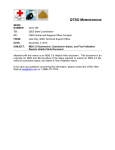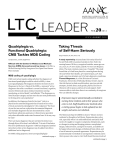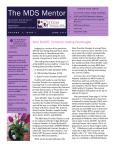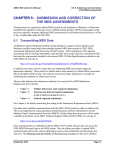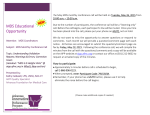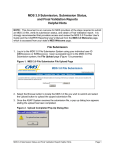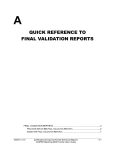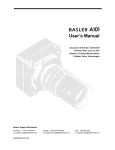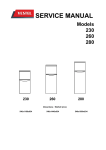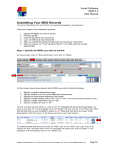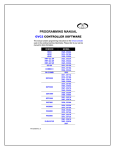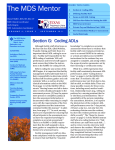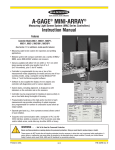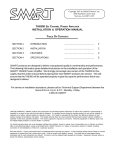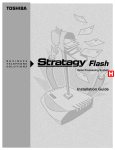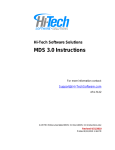Download “MDS 3.0 Updates-Are You Ready for April 1st?”
Transcript
3/21/2012 “MDS 3.0 Updates-Are You Ready for April 1stt?” Carol Hill RN, BSN, RAC-MT, C-NE, CDP Objectives By the end of this seminar participants will be able to: • Recognize MDS 3.0 changes that will become effective on April 1, 2012 • Distinguish between late vs. missed COT assessments • Id tif MDS 3.0 Identify 3 0 quality lit measures used d ffor survey process • Recognize changes to the CMS 672 • State process for completion of resident interviews on unplanned discharges • Recognize potential financial implications related to inactivation of PPS assessments • The following slides contain an overview of some of the RAI manual updates that will begin April 1, 2012.It is recommended that you obtain and review all the updates released. • The most recent RAI manual can be downloaded at http://www.cms.gov/NursingHomeQualityIni ts/45_NHQIMDS30TrainingMaterials.asp 1 3/21/2012 APRIL 1, 2012 RAI Manual V1.08 Item Sets Version 1.10.4 April 2012 Changes • A0050 Type of Record – 1. Add new record – 2. Modify existing record – 3. 3 Inactivate existing record • A0310 G. Type of Discharge – 1. Planned – 2. Unplanned April 2012 Changes • A1500 Preadmission Screening and Resident Review – Now complete on Admission, Annual, Significant Change Change, Significant Correction to Prior Comprehensive Assessment 2 3/21/2012 April 2012 Changes • A1510 Level II PASRR Conditions – A. Serious mental illness – B. Intellectual Disability (“mental retardation” in Federal regulations) retardation – C. Other related conditions April 2012 Changes • A1800 Entered From – 09. Long Term Care Hospital (LTCH) • A2100 Discharge Di h Status St t – 09. Long Term Care Hospital (LTCH) April 2012 Changes • E0100 New heading title Potential Indicators of Psychosis • E0800 Rejection of Care-Presence & Frequency – Took the word or out of the definition • E1100 Change in Behavior or Other Symptoms – Compare to prior OBRA or scheduled PPS 3 3/21/2012 April 2012 Changes • G0110 Activities of Daily Living (ADL) Assistance – 8. Activity did not occur- activity did not occur or family and/or non non-facility facility staff provided care 100% of the time for that activity over the entire 7-day period April 2012 Changes • G0300E Surface-to-Surface Transfer – Transfer between bed and chair or wheelchair April 2012 Changes • Section I – I4800 added Lewy body dementia Nursing Monitoring: includes clinical monitoring by a licensed nurse (e.g. serial blood pressure evaluations, medication management, etc.) 4 3/21/2012 April 2012 Changes • J1900: Number of Falls Since Admission/Entry or Reentry or Prior Assessment (OBRA or Scheduled PPS), whichever is more recent. recent April 2012 Changes • K0200 Height and Weight – Base height on most recent height since the most recent admission/entry or reentry – Base weight on the most recent measure in the last 30 days. April 2012 Changes • K0310 Weight Gain – 0. No – 1. Yes, on physician prescribed weight gain regimen – 2. Yes, not on physician prescribed weight gain regimen 5 3/21/2012 April 2012 Changes • K0510 Nutritional Approaches – Item number changed – Now two columns • While not a resident • While a resident April 2012 Changes • M0700 Most Severe Tissue Type for Any Pressure Ulcer – 9. None of the Above • Stage 1 • Stage 2 with intact blister • Unstageable due to non-removable dressing/device • Unstageable due to suspected deep tissue injury April 2012 Changes • M0800: Worsening in Pressure Ulcer Status Since Prior Assessment (OBRA or scheduled PPS) or Last Admission/Entry or Reentry • M0900 Healed Pressure Ulcers – A. Were pressure ulcers present on the prior assessment (OBRA or scheduled PPS) 6 3/21/2012 April 2012 Changes • M1040 Other Ulcers, Wounds and Skin Problems – G. Skin tear(s) – H. H Moisture Associated Skin Damage (MASD) (i.e. incontinence (IAD), perspiration, drainage). April 2012 Changes • M1040H Moisture Associated Skin Damage (MASD) – Moisture associated skin damage is a result of skin damage caused by moisture rather than pressure. It is caused by sustained exposure to moisture which can be caused, for example, by incontinence, wound exudate and perspiration. MASD is also referred to as incontinence dermatitis. April 2012 Changes • M1200 Skin and Ulcer Treatments – E. Pressure ulcer care • N0410 Medications M di ti Received R i d – Indicate the number of days the resident received the following medications during the last 7 days or since admission/entry or reentry if less than 7 days. 7 3/21/2012 April 2012 Changes • O0250 Influenza Vaccine – Influenza season ends when Influenza is no longer active in your geographic area – Once the influenza vaccination has been administered to a resident for the current Influenza season, this value is carried forward until the new influenza season begins. April 2012 Changes • O0600 Physician Examinations • O0700 Physician Orders • Removed the statement cannot be an employee of the facility. April 2012 Changes • Q0300 Resident’s Overall Expectation – A. Select one for resident’s overall goal established during assessment process 8 3/21/2012 April 2012 Changes • Q0400 Discharge Plan – Removed B. What determination was made by the resident and the care planning p g team regarding g g discharge g to the community. – Active discharge planning already occurring April 2012 Changes • Q0490 Resident’s Preference to Avoid Being Asked Question Q0500B – Does the resident’s clinical record document a request that this question be asked only on comprehensive assessments? April 2012 Changes • Q0500 Return to Community – Question A Has the resident been asked about returning to the community? This question was deleted q – B. Ask the resident (or family or significant other if resident is unable to respond): “Do you want to talk to someone about the possibility of leaving this facility and returning to live and receive services in the community? 9 3/21/2012 April 2012 Changes • Q0550 Resident’s Preference to Avoid Being Asked Question Q0500B Again. • Q0600 Referral R f l – Has a referral been made to the local contact agency? • 0. No-referral not needed • 1. No-referral is or may be needed • 2. Yes-referral made April 2012 Changes • V0200 CAAs and Care Planning – B. Column heading changed to Care Planning Decision • Now reads location and date of CAA documentation April 2012 Changes • X0600 Type of Assessment – A. Federal OBRA Reason for Assessment • 99. None of the above – B. PPS Assessment • 99. None of the above – C. PPS Other Medicare Required Assessment-OMRA • 4. Change of therapy assessment 10 3/21/2012 April 2012 Changes • Z0300 Insurance Billing – A. RUG billing code – B. RUG billing version April 2012 Changes • Urinary Incontinence CAA Trigger – Resident has moisture associated skin damage M1040H=1 • Nutritional CAA Trigger – Any planned or unplanned weight gain April 2012 Changes • Definition Changes in Appendix A – Most Recent Medicare Stay – Nursing Monitoring • Appendix C Worksheets – Changes made to reflect new numbering of MDS items 11 3/21/2012 Discharge Assessments • Current assessment maximum 111 questions • April 1st, 2012 – Unplanned U l d di discharge h maximum i 77 questions – Planned discharge maximum 89 questions Standalone Unscheduled PPS Assessment Interviews • Effective April 1, 2012, when coding a standalone unscheduled PPS assessment (COT, EOT, SOT) the interview items may be coded using the responses provided by the resident on a previous scheduled assessment, if the interview responses from the scheduled assessment were obtained no more than 14 days prior to the ARD of the unscheduled assessment on which those responses will be used. ARD of Unscheduled PPS Assessment • Effective April 1, 2012, facilities are permitted to set the ARD on an unscheduled PPS assessment for a day within the allowable ARD window for that assessment no more than 2 days after the window has passed. 12 3/21/2012 QMs Survey and Public Reporting QMs • Percent of residents experiencing one or more falls with major injury (long stay) • Percent of residents who self-report moderate to severe pain (short stay) • Percent of residents who self-report moderate to severe pain (long stay) • Percent of residents with pressure ulcers that are new or worsened (short stay) Survey and Public Reporting QMs • Percent of residents with a urinary tract infection (long stay) • Percent of low-risk residents who lose control of their bowels or bladder (long stay) • Percent of residents who have/had a catheter inserted and left in their bladder (long stay) • Percent of residents who were physically restrained (long stay) 13 3/21/2012 Survey and Public Reporting QMs • Percent of residents whose need for help with activities of daily living has increased (long stay) • Percent of residents who lose too much weight (long stay) • Percent of residents who have depressive symptoms (long stay) • Percent of high-risk residents with pressure ulcers (long stay) Survey QMs • Percentage of long-stay residents who have had a fall during their episode of care • Percentage of long-stay long stay residents who are receiving psychoactive drugs but do not have evidence of psychotic or related conditions in the target period. Survey QMs • Percentage of long-stay residents who are receiving anti-anxiety medications or hypnotics but do not have evidence of psychotic or related conditions in the target period. • Percentage of long-stay residents who have behavior symptoms that affect others during the target period. 14 3/21/2012 Public Reporting QMs • Percent of residents assessed and appropriately given the seasonal influenza vaccine during the flu season (short stay) • Percent of residents assessed and appropriately given i th the seasonall influenza i fl vaccine i (long (l stay) • Percent of residents assessed and appropriately given the pneumococcal vaccine (short stay) • Percent of residents assessed and appropriately given the pneumococcal vaccine (long stay) 672/802 • 672 Items the same, instructions updated with MDS 3.0 fields • 802 SSame fi fields ld as MDS 2 2.0 0 plus l additional ones surveyors wanted • Instructions updated to MDS 3.0 fields Facility Reports • Facility Characteristics • Facility QM Report • Resident QM Report 15 3/21/2012 Notice of Medicare NonCoverage, or NOMNC • New combined Notice of Medicare Non-Coverage. This notice will replace the CMS 10123 (Original Medicare notice) and the CMS 10095 (Medicare Advantage notice). • Form Number 100123 • Must use this form no later than May 1, 2012 Detailed Explanation of NonCoverage, or DENC • New 100124 Notice has been issued • Must use this form no later than May 1, 2012 https://www.cms.gov/BNI/06_FFSEDNotic es.asp#TopOfPage Assessment Combination Combining Scheduled and Unscheduled PPS Assessments • If the ARD of an unscheduled PPS assessment fails within the ARD window (including grace days) of a scheduled PPS assessment, and the ARD for the scheduled assessment would be set for a day after that of the unscheduled assessment then the assessments must be combined. 16 3/21/2012 Assessment Combination Combining Scheduled and Unscheduled PPS Assessments • For example, if the ARD of an EOT OMRA is Day 14 of a resident’s stay and the 14-day scheduled PPS assessment is not set for prior to Day 14, then the assessments must be combined and facilities should use the appropriate AI code to indicate the combined assessment. Assessment Combination • If a scheduled assessment ARD is set for a day that is after the ARD set for an unscheduled assessment, and the ARD for the unscheduled assessment is set for a day within the scheduled assessment ARD window, then the scheduled assessment is not used for payment purposes. COT OMRA & Other Assessments • If the ARD of a PPS assessment used for payment is set for on or prior to Day 7 of the COT observation period, then no COT OMRA would be required. required 17 3/21/2012 Early Unscheduled Assessment Policy-COT OMRA • If the ARD for a COT OMRA is set for prior to Day 7 of the COT observation period, the facility must bill default rate the total number of days the assessment is out of compliance (the number of days by which this assessment is early). Early Unscheduled Assessment Policy-COT OMRA • The default rate is effective from Day 1 of the COT observation period and is billed for the number of days that the assessment is out of compliance. Facility may then bill the RUG from the early COT OMRA for the remainder of the COT observation period until the next scheduled or unscheduled assessment used for payment. Late Unscheduled Assessment Policy • If the SNF fails to set the ARD for an unscheduled PPS assessment within the defined ARD window for that assessment and the resident being assessment, assessed is still on Part A the ARD cannot be set for any earlier than the day the omission was identified. 18 3/21/2012 Late Unscheduled Assessment Policy • The total number of days the assessment is out of compliance, including the late ARD, must be billed at default beginning on the day that the assessment would have controlled payment. Missed Unscheduled Assessment • If the SNF fails to set the ARD for an unscheduled PPS assessment within the defined ARD window for that assessment, and the resident has been discharged from Part A, the assessment cannot be completed. • All days which would have been paid by the missed assessment, had it been completed timely, are considered providerliable and may not be billed. Compounding Effects • In each case of an early, late, or missed unscheduled assessment, SNFs must consider the degree to which the untimely assessments affect other assessment requirements. 19 3/21/2012 Compounding Effects • A COT OMRA is completed with an ARD set for Day 35, while Day 7 of the COT observation period was Day 37. The SNF then completes a subsequent COT OMRA with an ARD set for Day 42 (7 days from early COT ARD) while the subsequent COT ARD should have been Day 44 (7 days from appropriate COT ARD). Inactivations • Once an assessment is completed, edited, and accepted into the QIES ASAP system, providers may not change a previously completed MDS assessment as the resident’s status changes during the course of the resident’s stay-the MDS must be accurate as of the date of the ARD established by the time of the assessment. Inactivations • When the provider determines that an event date (ARD of any clinical assessment, entry date, and discharge date) or item A0310 (type of assessment) is inaccurate the provider must inactivate the record in the QIES ASAP system, then complete and submit a new MDS 3.0 record with the correct event date or type of assessment, ensuring that the clinical information is accurate (RAI Manual 5-12). 20 3/21/2012 Inactivations • If the ARD or Type of assessment is entered incorrectly, and the provider does not correct it within the encoding period , the provider must complete and submit a new MDS 3.0 record. Inactivations • In this instance a new ARD date must be established based on MDS requirements, which is the date the error’s determined or later, but not earlier. The new MDS 3.0 record being submitted to replace the inactivated record must include new signature and dates for all items based on the look-back period established by the new ARD and according to established MDS assessment completion requirements. ERROR MESSAGES 21 3/21/2012 Error Messages • Section 5 MDS 3.0 Provider User’s Manual – Error Messages • Passwords for transmission are individual passwords not facility passwords – Need to have more than one person with a password for transmission Error Messages • Common Fatal Errors – 1007 Duplicate Assessment – 1030 Missing Item – 3676 Invalid Item – 3573a Inconsistent Dates – 3693a Invalid Fac-ID Error Messages • Common Fatal Errors – 3693b Unauthorized Submitter – 3658 No Authority to Collect Data – 1004 Invalid HML File Format – 3668b Inconsistent O Items – 3783 Inconsistent X0800 22 3/21/2012 Error Messages • Common Warning Messages – 3806 Inconsistent A0100C – 1031 Resident Information Updated – 1032 Resident Provider Updated – 1060 Medicare FY2011 Rug IV Transition RUG Calculated – 3616b Incorrect RUG Logic Version Error Messages • Common Warning Messages – 3808 Missing/Invalid Data – 3616a Incorrect HIPPS/RUG Value – 3810d Record Submitted Late – 1019 Inconsistent Record Sequence – 3749a Assessment Completed Late Casper Reports • • • • • • Activity Report MDS 3.0 Admission/Reentry MDS 3.0 Assessments with Error Number MDS 3.0 Discharges MDS 3.0 Error Detail by Facility MDS 3.0 Errors by Field by Facility 23 3/21/2012 Casper Reports • • • • • • MDS 3.0 Missing Assessments MDS 3.0 NH Assessment Print MDS 3.0 RFA Statistics MDS 3.0 Roster MDS 3.0 Submission Statistics by Facility MDS 3.0 Vendor List SECTION Q Section Q • Discharge Planning – When the facility anticipates discharge a resident must have a discharge summary that indicates: • A recapitulation of the resident’s stay • A final summary of the resident’s status • A post-discharge plan of care 24 3/21/2012 Section Q • If resident wants to speak to someone regarding services available in the community – Complete the Nursing Home Discharge Planning Checklist Manual Changes • Errata document released March 12, 2012 • Additional errata documents to be released as needed • Next item set and manual update scheduled for September 2012 References • MDS 3.0 Manual http://www.cms.gov/NursingHomeQualityInits/45_NHQI MDS30TrainingMaterials.asp#TopOfPage • MDS 3.0 QM Users Manual http://www.cms.gov/NursingHomeQualityInits/30_NHQI p g g y _ MDS30TechnicalInformation.asp#TopOfPage • RAI and MDS Conference 2012 St. Louis MO • MDS 3.0 Provider User’s Manual https://www.qtso.com/mds30.html 25 3/21/2012 Hill Educational Services Inc. Carol Hill RN, BSN, RAC-MT, C-NE, CDP 9406 Asberry Road Warrior, AL 35180 Phone: 205-337-1807 Fax: 205-647-0717 [email protected] www.hilledservices.com 26


























